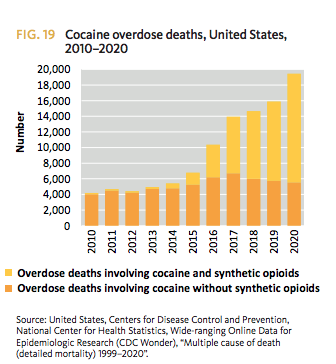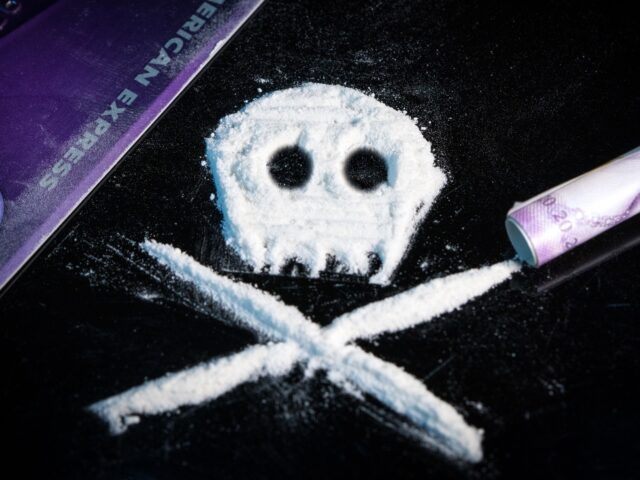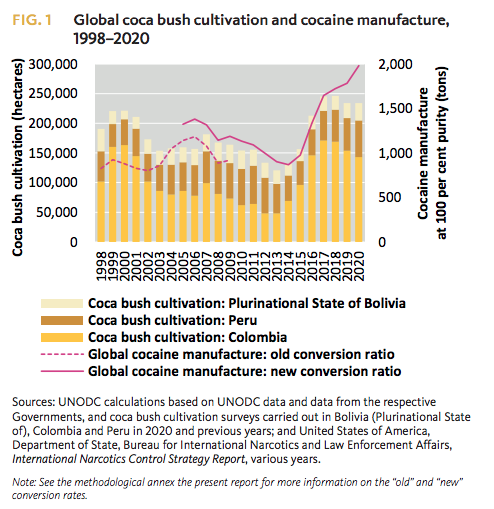The left-wing elite magazine the Economist called for the legalization of cocaine in a column this week, calling leftist President Joe Biden “too timid” for not publicly considering it and going so far as to claim that Marxist Colombian President Gustavo Petro – who called for decriminalizing the cocaine trade at the United Nations last month, also needed to be more extreme.
The Economist article, published on Wednesday, follows alarming revelations in this year’s United Nations World Drug Report that found “record-high” cocaine production globally. Over 60 percent of the world’s coca bush, used to manufacture the drug, comes from Colombia.
Production skyrocketed in the aftermath of a “peace deal” forced through Congress by the government of former Colombian President Juan Manuel Santos – but rejected by the Colombian people in a national referendum – between Bogotá and the Revolutionary Armed Forces of Colombia (FARC), a Marxist terrorist organization, in 2016. The deal legalized the FARC as a political party but has done little to eradicate its violent behavior or its highly profitable cocaine trafficking enterprise, which it maintains with the help of the socialist regime in Venezuela.
Following his election as the first-ever left-wing president of Colombia, the FARC issued a formal press release enthusiastically supporting Gustavo Petro.
Biden delisted the FARC as a terrorist organization last year, baffling the administration of then-Colombian President Iván Duque.
The Economist does not mention the FARC in its call to legalize cocaine, blaming the sudden surge in cocaine production following the 2016 “peace deal” on Richard Nixon.
“Since Richard Nixon launched the ‘war on drugs’ half a century ago, the flow of cocaine into the United States has surged. Global production hit a record of 1,982 tonnes in 2020, according to the latest data, though that is likely to be an underestimate,” the column claimed, offering a misleading time frame. The dramatic spike in cocaine manufacturing and overdose deaths in America began in 2016, the year of the FARC “peace deal,” not in the 1970s, according to the U.N.’s 2020 World Drug Report.
The magazine nonetheless used this argument, that Nixon had proven the failure of cocaine criminalization, to chastize Biden for not expanding his recent marijuana pardons to cocaine criminals.
“Prohibition is not working—and that can be seen most strikingly with cocaine, not cannabis,” the magazine affirmed, before applauding Petro and Peru’s Castillo, of the Leninist Free Peru party, for lobbying to legalize their countries’ lucrative export.
“Two presidents, Gustavo Petro of Colombia and Pedro Castillo of Peru, are clamouring for change. Mr Petro has suggested steering the police away from coca farmers by decriminalising coca-leaf production and allowing Colombians to consume cocaine safely,” the Economist praised, before condemning Petro and Castillo for not being radical enough.
“These are good ideas, but the cocaine gangs will remain powerful so long as their product is illegal in the rich countries that consume most of it, such as the United States,” the magazine insisted. “Half-measures, such as not prosecuting cocaine users, are not enough. If producing the stuff is still illegal, it will be criminals who produce it, and decriminalisation of consumption will probably increase demand and boost their profits.”
“The real answer is full legalisation, allowing non-criminals to supply a strictly regulated, highly taxed product, just as whisky- and cigarette-makers do. (Advertising it should be banned),” it continued.
Legalizing cocaine has long been a pet cause of the Latin American left. Evo Morales, a socialist former coca grower who became the socialist authoritarian leader of Bolivia, long used his platform to champion international legalization. The Bolivian delegation to the United Nations famously gifted then-Secretary General Ban Ki-Moon a coca birthday cake in 2014.
A 2015 report citing an American judicial document claimed that the Drug Enforcement Administration (DEA) had reason to believe that members of Morales government were involved in drug trafficking, aiding traffickers seeking access to the country. Morales’ government denied the allegations.
Petro, an aggressive promoter of the international green agenda, has repeatedly claimed that cocaine is less dangerous than fossil fuels and sugar. During his first speech at the United Nations General Assembly in September, he argued that cocaine is not that dangerous, minimizing overdose deaths.
“What is more poisonous for humanity, cocaine, coal or oil?” Petro asked the forum. “The opinion of [those in] power has commanded that cocaine is the poison and must be persecuted, even if it only causes minimal deaths by overdose, and more by the mixtures created as a result of its clandestine state. But, instead, coal and oil must be protected, even if their use can extinguish all mankind.”
The Economist concluded by predicting that legalizing the drug would result in access to “safer cocaine” for Americans, a benefit that allegedly greatly outweighed the costs of keeping the drug illegal.


COMMENTS
Please let us know if you're having issues with commenting.